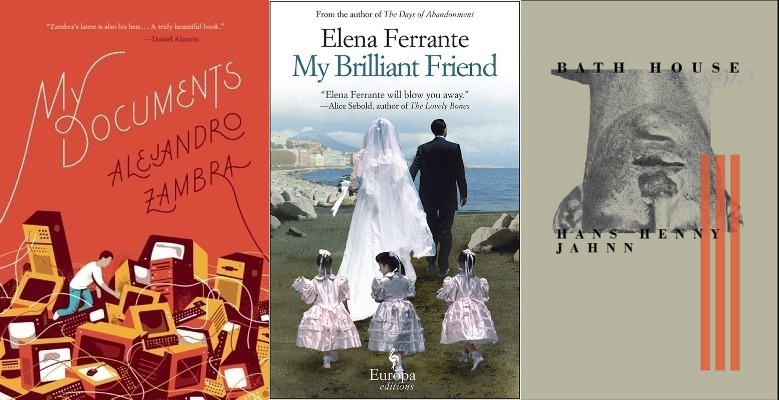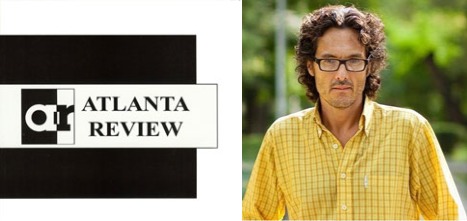Adrian Nathan West (Contributing Editor): German writer Hans Henny Jahnn is one of the least classifiable writers of the twentieth century, and the relative paucity of his work in English translation is perplexing. Among his compatriots, his admirers included Bertolt Brecht, Thomas Mann, Peter Weiss, and Wolfgang Koeppen—the last of whom compared Jahnn’s prose style to Martin Luther’s Bible; Jahnn is one of the poets cited in Roberto Bolaño’s “Unknown University;” and more recently, he was the subject of a long blog post by Dennis Cooper. The philosophical currents underlying his work have much in common with Georges Bataille: the focus on the limit-experience, often attained through an agony that grazes against beatitude, the emphasis on the organic substrate of conscious life, and an unsettling combination of orgiastic excess and monastic quietude characterize both men’s work, though Jahnn’s precise and involuted language is far more innovative than Bataille’s. READ MORE…
Posts by Patty Nash
What We’re Reading in July

What members of Asymptote's team have been reading—juicy, super-sweaty summer edition!
Weekly News Roundup, 3 July 2015: When Did You Become a Blog Reader?

This week's literary highlights from around the world
Happiest Friday, Asymptote pals! For those of us north of the equator, this summer season bodes lots of sweat and sunshine. Here’s some Internet reading to keep you occupied.
Japanese novelist and perennial point of Nobel speculation Haruki Murakami’s identified the very moment he became a novelist: at a baseball game. (Do you remember becoming a blog reader, dear one?). And over at the Paris Review, more behind-the-scenes author insight: here’s a full, unedited recording of an interview with Polish poet, translator, and all-around phenom Czeslaw Milosz. READ MORE…
Weekly News Roundup, 26th June 2015: Plagiarism You Don’t Remember

This week's literary highlights from across the world
Hey guys, happy Friday!
We frequently report happy awards-news (and don’t worry, we’ve got a bit this week, too). But unhappy literary awards news? Forget about it—until now. South Korean Man Asian Book Prize-winner Shin Kyung-Sook has (sort of) admitted to pilfering passages from Japanese writer Yukio Mishima’s work. Apparently, she “can’t trust her own memory” on the issue. Hm. And speaking of South Korean bestsellers—apparently the Talmud is a hot-ticket bestseller right now.
We’ve spoken about the buzz surrounding Algerian writer Kamel Daoud’s Prix Goncourt-winning (originally French-language, recently translated into English by John Cullen) The Meursault Investigation, itself a riff on Albert Camus’ legendary The Stranger—here’s another great review at NPR. Speaking of literary rivalries/riffs, here’s what Irish writer playwright George Bernhard Shaw thought of German philosopher Friedrich Nietzsche. READ MORE…
Weekly News Roundup, 19th June 2015: Schadensorrow, Bloomsday.

This week's literary highlights from across the world
Happy Friday, Asymptote pals! In the Internet, especially in the Translation Deep-Web we at Asymptote wander in, clickbait articles about “untranslate-able words” are so common we hardly register them any more. But articles about untranslate-able words that don’t exist yet—that’s another thing entirely. Why doesn’t “Schadenfreude” have an antonym?
You probably noted that this past week marked Bloomsday, a holiday for the literati invented by Irish writer James Joyce—who inspires fear and awe in most English-language readers. Not the case in China, apparently, where Finnegans Wake is a bestseller and several Joycean works, including the ominous Ulysses, have been adapted to the stage. In other unlikely artsy feel-good stories: you’ve probably never heard of Annecy, France (unless you went there for study-abroad like a certain roundup contributor). Here’s how a little picaresque French town became central in the international film circuit. But France isn’t the only country with an on-the-ball film scene: here’s why Chilewood should be on your radar. READ MORE…
Weekly News Roundup, 12th June 2015: What’s Pure Prose & Poetry?

This week's literary highlights from across the world
Happy Friday, Asymptote friends!
Big congratulations to the new poet laureate of the United States, Juan Felipe Herrera! Herrera attended the University of Iowa and his current gig is a direct update from his last one (he spent the past two years as poet laureate of the state of California, where he’s from).
Meanwhile, recommended reading abounds. The Millions reviews French-Algerian writer Kamel Daoud’s The Meursault Investigation, big winner of the Prix Goncourt and only recently appearing in John Cullen’s English translation (would have been nice to know this from the review—but, alas). In the Paris Review Daily, former blog contributor and all-around translator/thinker/writer extraordinaire Damion Searls argues for a lesser-known (stateside, at least) Norwegian writer: Jon Fosse. According to Searls: in the Beatles band of Norwegian lit, Fosse is George, “the quiet one, mystical.” Hmm. If Fosse is a pure/prose/poet, it’s important to remember the dutiful audacity of prose-at-large: how should we remember what and how prose writing accomplishes what it does? (I’d like to wager that translation plays a vital role in revealing the mechanics of language. But that’s just me). READ MORE…
In Conversation: Alex Cigale, Guest Editor of the Atlanta Review’s Russian Poetry Issue

An interview with Alex Cigale on editing the Atlanta Review's Russian Poetry Issue
I interviewed Alex Cigale, guest editor for the Russia issue of the Atlanta Review, to pick his brain about the editing process, the special issue, and the state of Russian poetry at-large.
Alex Cigale (former Central Asia editor-at-large for Asymptote!) has collaborated with the editors of the anthologyCrossing Centuries: the New Generation in Russian Poetry (2000), and more recently, the online Twenty First Century Russian Poetry (Big Bridge 16, 2014). Independently, he has presented a score of contemporary Russian poets to Anglophone readers. This year, Cigale was the recipient of an NEA in Literary Translation for his work with poet of the St. Petersburg philological school, Mikhail Eremin.
The Atlanta Review is known for its long-established and respected annual contest, offering publication in each of its fall issues, with a $1,000 top prize and 20 publication awards for finalists (including 30 merit awards for semi-finalists). In its 20-year history, it has published a long list of established poets, including Seamus Heaney, Rachel Hadas, Maxine Kumin, Stephen Dunn, Charles Wright, Billy Collins, Derek Walcott, Paul Muldoon, and so on.
PN: What did the Atlanta Review ask from you for its Russia Issue? How did you approach the editorship and solicit contributions?
AC: My directions were quite open: curate an 80-page section of contemporary Russian poetry. In every Spring issue, the Atlanta Review includes an international feature. In recent years, it had shone a spotlight on international hotspots (Pakistan, Afghanistan, Iran, etc.) as well as on Anglophone or partly-Anglophone nations in the news (India, Ireland, and Scotland, the latter forthcoming in 2016).
While each is planned two years in advance, the editorial phase itself is quite brief: in my case, I only had this past late fall/early winter to work on the curation, so its contents were largely determined by what unpublished work in translation was available at the moment. As I noted in my introduction, above all else, the issue is a “slice of life”—what (primarily American) translators of Russian poetry are working on right now. The world of Russian poetry translation is a fairly small community, so I was able to put out early word of the issue on social media and correspond with nearly each translator personally to discuss their projects. READ MORE…
Weekly News Roundup, 5th June 2015: Don’t Write Your Memoir.

This week's literary highlights from across the world
Happiest of Fridays, Asymptote pals! This is the first week Katrine, new blog co-editor, is on board—so let’s give her a big web-round-of-applause (tapping on the keyboard in the comments section helps). Hi Katrine! You might recognize Katrine because she was a judge for the Best Translated Book Award so, yeah—she’s a celeb.
Speaking of celebs, our former Central Asia Editor-at-Large, Alex Cigale, recently guest-edited a section on Russian poetry over at the Atlanta Review—it’s definitely worth checking out (and look for a blog interview on the guest-editing process soon). If you are a fan of the Norwegian Nobel Prizewinning bard, Tomas Transtömer, here’s a treat—his final interview given before his death, in translation. And, speaking of poetry—the New Yorker has an interesting piece on Jihadi poetry and what it means to share some words.
Multitasking artists: American playwright Tennessee Williams took up painting, once (just like American ex-President Dubya, whose outsider-art paintings I frankly prefer). And Dany Lafferière, a Haitian novelist who came of age in Canada, is the first non-French citizen to be admitted in the prestigious Académie Française.
What are your favorite authors’ favorite words? Here’s a little list. And what’s your favorite curse word—it might not have existed too long ago (except, of course, for “fart,” which has stood the test of time).
How does it feel to write and never be read? Most of us know, all too bitterly. But perennial Nobel-speculation and speculative-fiction writer, Canadian novelist/poet Margaret Atwood, has written for a library that won’t be available for another one hundred years. Will we all be screened-up e-readers by then? The Chicago Tribune thinks not. Nine hundred years later, we’re still collectively obsessed with the old Icelandic god, Loki, though. What gives?
Finally, please, and for the love of God—unless you are Karl Ove (in which case it is already too late): delete your memoir. If it’s written from a female perspective, it’s less likely to win any big prizes, anyway (ugh), unless, of course, it is the Bailey’s Women’s Prize for Fiction (congrats Ali Smith for How to Be Both, this year’s prizewinner). Prizes aren’t always great, though: even judge Marina Warner (from the Man Booker!) is bemoaning the dearth of world literature available in English—good thing journals like Asymptote are working to buck that trend.
Weekly News Roundup, 28 May 2015: PEN! BTBA! IFFP!

This week's literary highlights from across the world
Happy Friday, Asymptote! For those of us interested in translation—and the funds to pay for it—the day the PEN/Heim Translation Fund awards/fellowships are announced is always good. Special congrats to Dong Li, Asymptote blog friend—but he’s by no means the only familiar name on the list. Big congrats to all the winners, and the blog wishes you luck on all your projects!
And. Continuing the theme of huge news (for translators, writers, and readers at least—and aren’t we all?), Three Percent has announced the winners for the Best Translated Book Awards! In the fiction category, top honors go to Chinese author Can Xue (who we interviewed in the journal over a year ago) for her novel The Last Lover translated by Annelise Finegan Wasmoen, and Rocío Cerón’s Diorama, which was translated from the Spanish by Anna Rosenwong. Pride note: new blog co-editor, Katrine Jensen, was a member of the judging panel—so you can trust these picks! READ MORE…
Weekly News Roundup, 21 May 2015: Booker, the Man

This week's literary highlights from across the globe
Happy Friday, Asymptoters! You must be rather cozy living under a rock if you haven’t heard the most explosive news of the week: Hungarian writer (and Asymptote contributor!) László Krasznahorkai has won the prestigious International Man Booker Prize this year. He received 60,000 pounds sterling, but a 15,000-pound prize for his English-language translators is split between George Szirtes and Ottilie Mulzet (also contributors to both blog and journal). This year’s snag means things are stacked two-for-two with regard to the Man Booker and Asymptote. Two years ago, Lydia Davis earned top honors—and you can see her work in the journal, herself translating from the Dutch in 2013. Furthermore in lit prizes: at Wall Street Journal, an interview with the most recent “Arab Booker”—also known as the International Prize for Arab Fiction—prizewinner: Tunisian novelist and prizwinner Shukri Mabkhout opens up on novelizing the political crises and opening literary doors in the region. READ MORE…
From the Archives: “Resistance Is Futile” by Walter Siti

In this ongoing series, a look at fiction from our January 2015 issue translated by Antony Shugaar
What is “autofiction?”
I don’t know. I really don’t. “Autofiction” belongs to the category of words I’ll habitually skim over in lieu of context clues. (Also in this category: “antifiction,” “matron literature,” “ergodic literature”—any ideas?). Critics toss around categories such as these so flippantly, practically taunting their readers to look them up on Wikipedia, but unless I get the sense that the term is particularly operative, I am likely to continue reading.
I came across “autofiction” more recently: after reading the incredible excerpt from Walter Siti’s Resistance is Futile from our latest issue (translated from the Italian by longtime blog contributor/superstar translator Antony Shugaar). In his translator’s note, Shugaar says that Siti’s “approach is called autofiction” and that “Siti seems to swing it over his head recklessly like a heavy gold chain.”
I’m intrigued. But first and foremost, I’m intrigued by the excerpt itself, because Resistence is Futile is incredible. Written in increasingly circular retrospect, the story’s more a taut deferral of linearly cruel memory than anything resembling realist fiction, but that’s not to say it isn’t visceral, gutting, utterly material, and wrenching, as it recounts the youth of an unfortunately corpulent young boy, Tommaso.
The boy’s fat—that’s because he was a slow eater as an infant—and worse still, even that’s because the mother may or may not have “somehow been jinxed, conceived under a bad star” after she “got it stuck in her head that the child had been generated the very night that her husband came home drunk (and as far as that went, nothing out of the ordinary), cursing and washing the blood off himself.” READ MORE…
Weekly News Roundup, 15th Mary 2015: PEN or Sword, Too Many Prizes

This week's literary highlights from across the world
Happy Friday, Asymptote friends! Another day, another dollar, another slew of literary prizes to report. This week, the PEN prizes were of special interest: Two Lines Press’ translation of Baboon, written by Danish author Naja Marie Aidt with translation by Denise Neuman has snagged the PEN Translation Prize (for a short-story excerpt from Baboon, click here!—or better yet: read Eric MIchael Becker’s exclusive interview with the author here). Meanwhile, the Helen and Kurt Wolff Translator’s Prize (for translations of German-into-English) is slated to go to Catherine Schelbert, for her translation of Hugo Ball’s Flametti. And the Oxford-Weidenfeld Translation Prize has announced its shortlist, which includes our own friend of the blog (and Tiff-ster) Susan Bernofsky, for her translation of German writer Jenny Erpenbeck’s The End of Days (coincidentally reviewed here in our latest issue). READ MORE…
In Review: “Self-Portrait in Green” by Marie NDiaye

Translated by Jordan Stump, and published by Two Lines Press
Let me talk about selfies.
Are you annoyed yet? I promise this isn’t a curmudgeonly thinkpiece about millennials; nor is it a listicle written by said millennials in defense of the selfie.* No, I’d like to talk about self-portraiture, which became conceivable as soon as mirrors and other reflective surfaces were available. (Narcissus may have enjoyed his reflection in antiquity, but he wasn’t real, and pools of water are never that smooth). The idea here is objectivity. A stable you that you can see.
Even without gadgetry (mirrors, glassy ponds, cameras et al)—I don’t think a selfie is a foray into solipsism. More the opposite: the way the self-it-self has been constructed is a result of the litany of selves surrounding it. We adjust to resemble, even when affirming our individual self-ness. Every selfie (can we say “self-portrait” now? I’m sorry!) exists as an algorithmic product of the selves around it, which, through refraction and contortion, inform whatever “self” is portrait-ed. This is true even sans Instagram.
This, at least, is my hypothesis after reading Two Lines Press’ 2014 publication, Self Portrait in Green, by French writer Marie NDiaye and meticulously translated by Jordan Stump. The slender novella is written in the first person against the stark relief of an ominous threat, one of a flood that is slated to destroy the village the narrator inhabits, by 2003. Through a series of recollections, Self Portrait in Green navigates a universe of threat, both environmental and interpersonal, through an interconnected series of engagements the narrator litanies against women afflicted by the color green. READ MORE…
Weekly News Roundup, 8th May 2015: Finnegan’s Woke, Emoji Language

This week's literary highlights from across the world
Happy Friday, Asymptote friends! While you are struggling to convince your chapbook-making friend to publish your manuscript, in Iceland there’s the opposite “problem:” are there too many books being published? (I have a hard time believing such a thing exists). Meanwhile, the International New York Times wonders who publishes the most foreign fiction stateside (answer: Amazon. But you knew that already).
Like translations? Like the Internet? We forgive you for never having completed Finnegans Wake by Irish legend James Joyce—especially since the confounding book is confounded by an exciting and experimental turn in collaborative translations and readings: take a look at Waywords & Meansigns (and keep an eye out for an interview on the blog!). It’s a book designed for the Internet, after all. Asymptote alum, contributing editor, and all-out translator celebrity Adrian Nathan West has got a new book forthcoming: The Art of Flying by Spanish graphic novelist Antonio Altaribba. Check out Words Without Borders for ten tantalizing sample pages. And if you’re interested in re-iterations of epic tomes and animation, check out these animations of Crime and Punishment, by Russian lit-demigod Fyodor Dostoyevsky. READ MORE…

